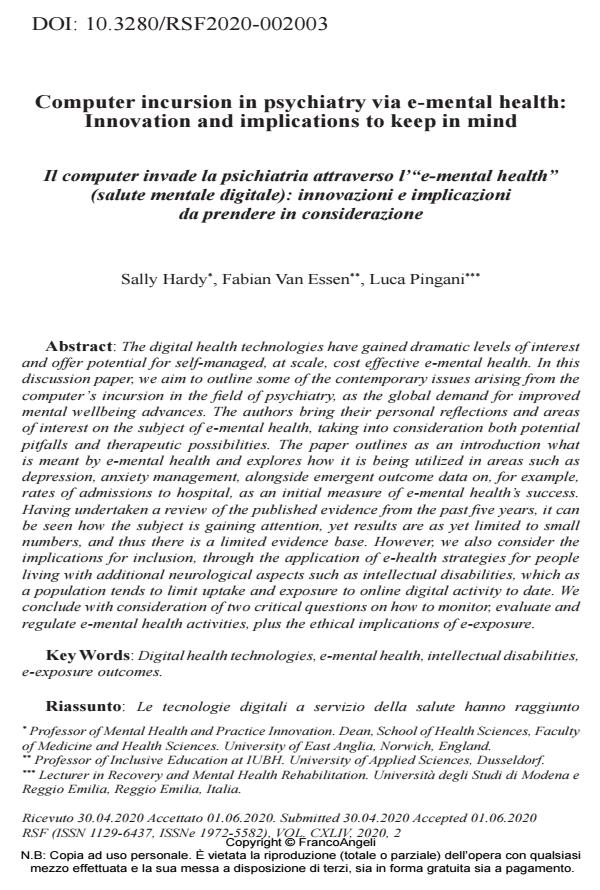Computer incursion in psychiatry via e-mental health: Innovation and implications to keep in mind
Journal title RIVISTA SPERIMENTALE DI FRENIATRIA
Author/s Sally Hardy, Fabian Van Essen, Luca Pingani
Publishing Year 2020 Issue 2020/2
Language English Pages 12 P. 33-44 File size 176 KB
DOI 10.3280/RSF2020-002003
DOI is like a bar code for intellectual property: to have more infomation
click here
Below, you can see the article first page
If you want to buy this article in PDF format, you can do it, following the instructions to buy download credits

FrancoAngeli is member of Publishers International Linking Association, Inc (PILA), a not-for-profit association which run the CrossRef service enabling links to and from online scholarly content.
The digital health technologies have gained dramatic levels of interest and offer potential for self-managed, at scale, cost effective e-mental health. In this discussion paper, we aim to outline some of the contemporary issues arising from the computer’s incursion in the field of psychiatry, as the global demand for improved mental wellbeing advances. The authors bring their personal reflections and areas of interest on the subject of e-mental health, taking into consideration both potential pitfalls and therapeutic possibilities. The paper outlines as an introduction what is meant by e-mental health and explores how it is being utilized in areas such as depression, anxiety management, alongside emergent outcome data on, for example, rates of admissions to hospital, as an initial measure of e-mental health’s success. Having undertaken a review of the published evidence from the past five years, it can be seen how the subject is gaining attention, yet results are as yet limited to small numbers, and thus there is a limited evidence base. However, we also consider the implications for inclusion, through the application of e-health strategies for people living with additional neurological aspects such as intellectual disabilities, which as a population tends to limit uptake and exposure to online digital activity to date. We conclude with consideration of two critical questions on how to monitor, evaluate and regulate e-mental health activities, plus the ethical implications of e-exposure.
Keywords: Digital health technologies, e-mental health, intellectual disabilities, e-exposure outcomes.
Sally Hardy, Fabian Van Essen, Luca Pingani, Computer incursion in psychiatry via e-mental health: Innovation and implications to keep in mind in "RIVISTA SPERIMENTALE DI FRENIATRIA" 2/2020, pp 33-44, DOI: 10.3280/RSF2020-002003